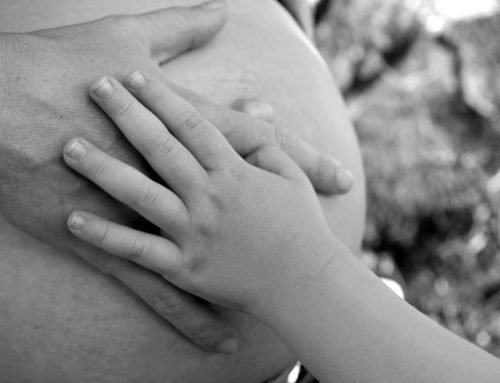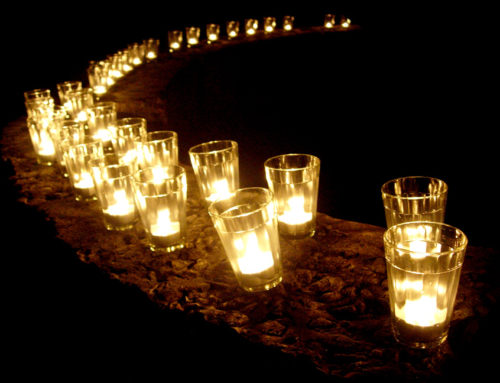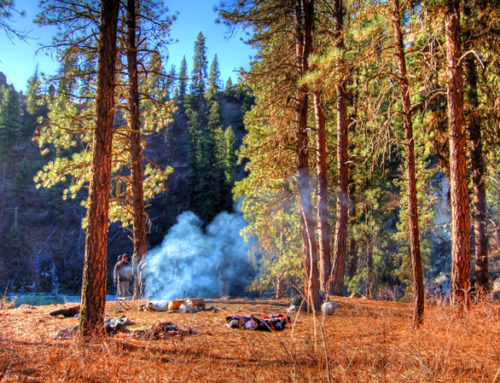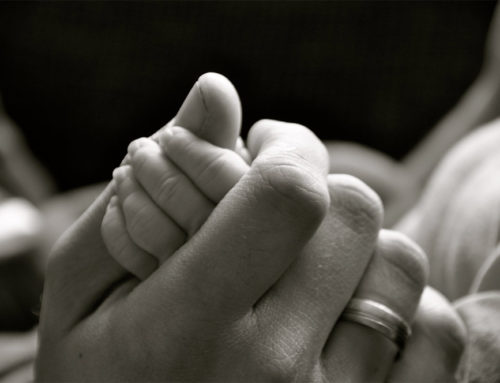“She must even have hoped to some day be at such a place…. But she permits herself ambivalence; to feel both at home here, and, that she is better than all this. ‘Welcome, Madame’…”
DOWNLOAD THE PDF –> Three Day Wind by Lisa Battalia
OR READ THE REST OF THE STORY BELOW
THREE DAY WIND
They pull their car into the resort’s tree-lined driveway. A cliche, she acknowledges to herself, but the manufactured drama of gnarled trunks and achingly arched branches, lined up as if to eternity, would capture anyone’s attention. Elise sits up straighter. They roll over uniform black stones, devoid of ruts. She smiles to see the manicured elegance, guessing at the cost of maintaining such a pristine path. The resort is even more beautiful than the pictures online. It is relatively new, but the buildings and villas have been tailored to blend near imperceptibly into the curves and colors and textures of the landscape. She breaths deeply and her nostrils fill with dry air and the clingy smell of lavender.
She wishes she felt more comfortable in her outfit, a custom made silk suit that was a gift from her husband, Andrew. What else might she have done with that money? He insisted she wear it, and so far, she has succeeded in keeping her young children from wiping their hands on the skirt. When she gets out, though, she sees that it is hopelessly wrinkled, and her disappointment prompts a sudden ambivalence: Why should it be that money safeguards access to things like beauty, things meant to be unbounded?
“Welcome, Madame. Such a lovely day,” a smartly dressed valet greets her and sweeps his hand towards the entrance doors, “and your arrival has kept the mistral at bay.”
“Excuse me,” she says.
“The mistral, surely you are aware of it this time of year.”
“Of course, yes, I just didn’t hear you.”
She quickly takes the hand of each child, one girl, one boy, ages four and six, and heads inside. Her daughter seems spooked at the doors’ effortless functioning, whooshing shut behind them, closing off Andrew’s voice negotiating expected perks. Her children, so squirmy towards the end of the drive, are immediately stilled by the expanse of the reception area. The room commands a view through its back wall of floor-to-ceiling glass; it seems to contain a hush, like a whispered voice, “yes, I know, isn’t it magnificent.” Before them lay the hills of Provence, swathed in color, saturated by sunlight — burnt sienna tiles, purple lilac and bougainvillea. Rows of deep green cyprus trees stand guard over hills dotted with the remains of old, old civilizations as if protecting them from the current invasion of monied citizens. She could look forever, but it’s has been a long drive.
“The kids need to eat,” she says to her husband who has followed them in. They walk into the first dinning room they see. The tables are almost completely occupied, but the room is strangely quiet with the brisk but near silent movement of waiters and staff. She is anxious that her children cannot be as still as is required, so she gives them the sharp-eyed look, the one that says “here, you will behave.”
“Let’s order quickly,” she says to Andrew. But she knows he will want to take his time with the menu. He is significantly older than she. They met when he was forty-seven, she twenty-nine. He had been living the life of a well-off, well-traveled bachelor for a long while and his habits were fully hardened. She knows he must mull over the foodie choices. The waiter apparently senses her discomfort and brings their food quickly. Still, lunch ends prematurely when their daughter spills most of her Shirley Temple on the table, on her new dress, on the exquisite restaurant carpet.
“I’ve told you a thousand times to be more careful,” her husband says sharply, he looks from their daughter to her. “Does she have to spill everything?” Elise wishes now that she asked for a child-friendly cup. Their daughter sobs with shame, and though Elise tells Andrew to stay and enjoy the rest of his meal; that she will take their daughter to their villa to change; too many people have turned towards them alarmed by the noise they are making, so he leaves as well.
~~~
The resort’s buildings are connected by thin dirt paths just wide enough for the electric carts. One pulls up, efficient as a bird building its nest as it moves from one place to another, shuffling people, or bringing them some little thing. Their cart is open-topped and its soundless engine leaves Elise feeling momentarily like she is flying. Her daughter has recovered and is thrilled to be allowed to ride in the back seat with her brother, facing out, not a seat belt in sight. They bump around and into each other and screech with delight each time the drivers seems intentionally to take another excessively sharp turn. He jumps out when they arrive and swings open the villa door. Elise watches her son’s eyes grow wide.
The villa is so much bigger than the hotel room they’d just occupied back in the States, in a large country inn her parents had booked in its entirety to celebrate fifty years of marriage. Still, the inn and its surroundings were more than enough to entice her four siblings and their spouses, and her parents’ fourteen grandchildren to come share it with them for ten days. The rest of them are still there. Elise and her family had left after just three nights.
It was a decision she and Andrew made months ago. If they spent the entire time with her family, they would not be able to take their own summer vacation. Their children might just be old enough to behave appropriately at the kind of resort that her husband believes they should go to, and more often, the kind of place his clients frequent. Elise has played her part. Her children are adorably and well mannered. They are a family, she notes uncomfortably, and not for the first time, that shows well at his firm’s summer picnic.
Lately she has been struggling to explain to Andrew how inconsequential this life feels. She would have preferred the extended time with her family. Her initial worry that her children — the youngest of all her siblings’ children — might be overwhelmed by their older cousins, had been replaced by a desire to let them experience the messy, complicated organism that is her family. That is life. Her family can be too much, she’s had enough distance to see that. They can be oblivious to their environmental impact when they are together. It can bother outsiders; it bothers her husband more than anyone. But her family’s rivalries, and laughter, their in-the-moment-ness defines them and can spill over generously to those willing to partake.
Is it really fair of her to change the rules? She fell in love with her Andrew’s success, was drawn to his sureness and authority in all manner of things. The boys she had previously dated paled in comparison, and the work that she had been doing, glorified administrative work, left her each night with a head ache and longing for more. Even her family’s Sunday night dinners had started to feel so small town. It all changed when she met Andrew, as if she had clicked her heals together three times but wished for the opposite of everything Dorothy thought mattered. Elise’s world view expanded dramatically, new places, new notions of what was special and desirable and luxurious; drinking it in, and surely feeding some need of Andrew’s, as he enjoyed her unbridled wonder and undivided attention.
Their son was born only fifteen months after their wedding, followed two years later by a daughter. She loves being a mother. She doesn’t want to listen anymore to Andrew talk about things only of interest to Andrew. She wants him to see the joy that unfolds before them everyday, if only he would engage his children for more than a few minutes. Mostly, though, she didn’t want to see that look again, as close as she’d ever been to the receiving end of contempt. It was a moment on their fifth anniversary, Andrew had surprised her with the itinerary for an extravagant trip for two, but she said no. She just couldn’t leave her children yet.
~ ~ ~
The living room of the villa is accented with artful objects. There is a patio with an exquisite view through large french doors. To the left is a bedroom with the widest bed she has ever seen, the top half of which is buried in over-large pillows. While the driver is pointing out to the children the living room couch that will turn into their bed, she is assessing what items must immediately be put away or up on a high shelf. It’s too much delay. The children are desperate to bounce on the humungous bed, measure their bodies against the oversized bathtub, see if a room of such dimensions can be turned into a race track.
Her husband listens carefully to the young man and asks his own questions, raising his voice above the children’s: “Where are speakers located? In the bathroom? Can they order a private dinner to be served on the patio?”
“Yes, of course,” says the driver. She knows her husband is ensuring that they get their money’s worth in light of the near comical cost of the room. She is also certain that his enjoyment of its luxury and possibilities will not survive the increasing excitement of the children. He is about to pronounce the long list of “off-limits.”
“I’ll take them to the pool,” she says.
“It is a perfect day for a swim,” the driver responds, “only a bit of a chill, and the pool is heated. Better still, no mistral as yet to disturb your pleasure.”
That word again. She is about to ask him to explain, but her husband cuts her off with a question about internet service, so, instead, she steers the children towards the bathroom. The three of them change into bathing suits and are quickly out the door.
“I’ll join you in a minute,” her husband promises.
“Take your time.”
The pool is built into the hillside, perched on an enhanced precipice. It is made to look as though the water within it is falling freely, un-captured, off the far edge. She sinks down for warmth and when she looks out, it’s as if she has become the hills of Provence. The children are swimming near, but are caught up in their own world. It is a place that, no matter how much she matters in their day-to-day lives, she is not welcome. Their play is entirely physical. Imagining they are merpeople perhaps, her daughter clings to her son’s slippery back, diving and twisting as he does, half-frightened, half-thrilled. They do these things over and over again, all fluid movement and laughter, as graceful as porpoises.
She feels bad when she tells them it’s time to get out, but their lips are turning purple and her husband has yet to join them. He had said he wanted to spend more time with his children. It was another reason they’d left early from her family’s shared vacation. So she takes them back to the room. The minute they enter, her husband puts a finger to his pursed lips. He is on the phone. So she settles the children into a quiet art project on the table on the patio — the table is made of glass so she can wipe off the mess. Of course they insist that she not to read a book, or even stare idly at the view. They need her to suggest paint colors and admire each brush stroke.
~ ~ ~
Her parents had quickly relaxed into retirement — all the stress of raising and launching five children released like a big, belchy sigh. Still, they were happiest with everyone together, house rules minimized and few expectations but to enjoy the chaos. At the inn, her kids had been released from meals as soon as they wolfed down a few bites. They were allowed to run barefoot and barely clothed, to climb trees and touch frogs. Only the river was off limits — and not even that if an older cousin went with them, so the older ones got dragged along. Grudgingly pulled from their electronic connections, they returned with grins as undisciplined and grateful as pigs in mud. Her children were so happy. They seemed barely to need her. She was happy too. While Andrew remained in the same narrow chair reading — visibly anxious at her family’s viral creep over the house and grounds — she had embarked on small pleasures like allowing herself to read and nap in the late afternoon sun.
On the last morning, she suddenly realized how hard it was going to be to leave first. They had re-synced. It had taken a few days, but like saggy spots in a old cushion, sibling hierarchy, childish manners, even old hurts fell back into place. She knew that was when they would really start to enjoy each other, trading affectionate insults during meals, and ping pong tournaments, and perilous moments on the river. Everyone would have their story of how they almost…. She longed to see her children carve their own place in her loyal, competitive family. If they just had a few more days. But you don’t, on a whim, change transatlantic travel plans, booked months in advance to ensure the best seats and accommodations.
Tonight her children are staying with a babysitter that the hotel staff has arranged. She and Andrew are dining in the hotel’s fanciest restaurant with seats enough only for the handful of guests who knew to make the reservation the moment they booked a villa. Elise is anxious that the babysitter not be too old or too strict. She wonders what her family will be doing for dinner tonight. They had been threatening to take over the inn’s kitchen one night for a friendly cooking competition.
~ ~ ~
Elise nearly gasps when that evening they walk into the resort dining room. It is the most elegant, yet inviting room she has ever seen. Extravagant looking plates keep arriving from the moment they sit down. Food imagined in so many unexpected ways, there is almost no place for conversation. The only thing that seems appropriate is to exclaim over the sculptured presentations, “is that really edible,” the sensations on the tongue, the way it all works together so deliciously. Still, three times she opens her mouth to say something else. She wants to talk about missing her family, and about their kids, to try to describe how beautifully they swam together that afternoon. Finally, she asks:
“Are you happy?”
“What do you mean?” Andrew asks.
“What I said. That’s all.”
“Of course I am happy. Look where we are. Do you know how few people this restaurant served last year? It’s extraordinary that they have maintaining such exclusivity.”
Elise looks down at the latest plate to arrive.
“Have you gone over to the spa?” Her husband asks.
“I was with the children all day.”
“Why not hire the babysitter for a few hours tomorrow.”
“Let’s see how they like her tonight.” Then she waits to be asked something, perhaps the same question, the one about happiness, but they finish in silence.
~ ~ ~
Their son and daughter wake them the next morning, frightened by the howling of a strong, ceaseless wind. They are unable to eat their breakfast at the patio table, as planned. The young man who delivers their food explains why as he methodically lays out the many components of the resort breakfast on the table in the living room.
“The mistral has arrived.” He places napkins, silverware, and tea cups for each of them.
“Who is that?” asks her son.
“Not who. What,” he answers, adding several baskets of fresh bread and pastries and a plate of exotic fresh fruits, then butter and jellies.
“You’re funny,” says her daughter, watching him carefully as he adds separate pots of coffee and hot chocolate and water for tea.
“The mistral is a wind that comes to visit. We never know exactly when it will arrive but it lasts three days and then ceases,” the young man says this as he places the last items on the table.
“Exactly three days?” her son asks, raising an eyebrow. Elise is thinking about the breakfast service, how another person will have to set up the whole thing again tomorrow.
“But yes,” the young man answers, “almost always three days, and then the wind stops as suddenly as it started. The mistral will bring cold today. Perhaps you should find things to do inside.”
Her least favorite words.
“Sounds like a day to catch up with the office,” says her husband. “I’ll use the executive lounge.”
After she has run out of art projects, and has read every book, heard “we’re bored” a hundred times, eaten snacks from the minibar, let the children briefly jump on the bed, drawn them a bath and cleaned up from their “waves,” she lets the children watch a DVD. She showers and puts on a little make-up, just in case they make a trip to the lounge for afternoon tea. She sits for a moment on the wide marble slab surrounding the bathtub.
She thinks about her family, imagining glimpses of their fun. She becomes aware of a feeling she has not infrequently these days. It’s like a punch in the tender part of her belly when, no matter how much she dissembles, she knows suddenly that her instinct had been correct, and she had ignored it, and now it is too late to fix. They should have stayed longer with her family at the inn. Her children loved being there. Of course she would regret leaving first, while everyone else remained. This place, though unbelievably beautiful, is no place for young children.
Then she remembers the butterfly kite coloring kits she had tucked in her suitcase — a last minute purchase for dual-purpose entertainment. She shuts off the television and sweeps the kids off the bed and out the door.
“I have the perfect thing to do,” she tells them.
They fly the kites from their villa’s patio without even bothering first to color them in. Still, they are beautiful, perhaps more so, their papery whiteness such a sight against the dense green and purple foliage. The wind makes them wild and seem dangerous; her kids have to hold tight. They fly them for more than an hour before her children finally get tired and they stop to visit the lounge for tea. As soon as they return they fly the kites some more. When her son asks if they can fly the kites again after dinner, she says no. She is exhausted from having had to create a whole day’s worth of distraction. The winds will still be here tomorrow, she remembers, and the day after that.
“We’ll fly the kites as soon as we wake up,” she says. “We’ll fly them by the pool. Maybe other kids are stuck in their rooms and they’ll be so surprised, they’ll come out and play.” Her son smiles at the inherent mischievousness in the plan. It is almost enough.
“Please, please, pleeeease can we fly them one more time today?” They beg together.
“No.” They know this answer is final.
~~~
The children fall asleep easily after eating ridiculously expensive bowls of room service pasta. She too falls asleep quickly, alone, after she and Andrew shared a fancier room service meal and an expensive bottle of wine. He returned to the hotel lounge to smoke a late-evening cigar. She had not heard him return, but when she wakes, Andrew is there next to her. She wriggles her nose at the reek of cigar smoke that lingers on him.
And then she notices. The wind has stopped, absolutely, as if it never was. No! They had promised her three days. She begins to sob, surprising herself with the force of the tears. She buries her face in the thick pillow so as not to wake anyone, but she cannot hide her body’s contortions.
“You’ll scare the children,” Andrew says awakened. “What can possibly be wrong?”
“Listen,” she says. “The wind — it stopped. We should have flown the kites again. The kids, they loved it so much, and now we won’t have another chance.”
His mouth hangs open, clearly at a loss to understand her devastation. But seeing his annoyance, Elise becomes aware of what might lie beneath her sadness, a palpable anger, though, like a birth pang, productive. There is just no room for, she cannot bear, another regret.



